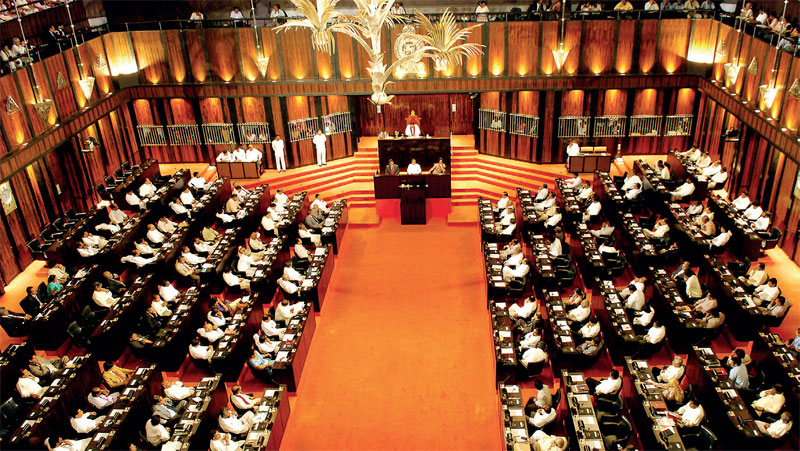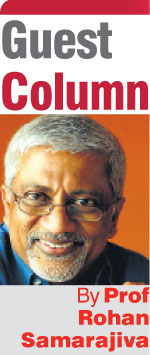Tuesday Feb 17, 2026
Tuesday Feb 17, 2026
Wednesday, 29 December 2021 00:54 - - {{hitsCtrl.values.hits}}

The quality of members of parliament leaves much to be desired. If that reality is taken into account, reliance on an idealised and obsolete conception of parliamentary accountability is foolhardy
 Many put forward proposals for constitutional reform, writing profusely on the subject, but fail to get any responses, negative or positive. We at the National Movement for Social Justice are gratified that our proposals are eliciting many responses. It would be nice not to be called stupid and incapable of understanding the immutable features of the parliamentary system of governance, but rude engagement is still preferable to being ignored.
Many put forward proposals for constitutional reform, writing profusely on the subject, but fail to get any responses, negative or positive. We at the National Movement for Social Justice are gratified that our proposals are eliciting many responses. It would be nice not to be called stupid and incapable of understanding the immutable features of the parliamentary system of governance, but rude engagement is still preferable to being ignored.
The present response is to Victor Ivan’s critique of the NMSJ proposals, with a specific focus on the umbrage he has taken on the proposal to establish independent commissions, with a Constitutional Commission with a majority of members being persons who are not engaged in active politics as the appointing/approving authority.
The criticism of independent commissions is twofold: first, they are inappropriate as checks and balances in a parliamentary system; second, they failed under the 17th and 19th Amendments.
Accountability through Parliament is not enough
The first criticism appears based on some idealised conception of a parliamentary system which assumes that the accountability of the Prime Minister and Cabinet to Parliament not only makes additional constraints superfluous, but harmful. I was surprised by this claim, having seen in many countries, instances of Ministerial or Cabinet powers being constrained with regard to appointments to, and removal of, members of regulatory bodies. Advising governments and teaching public utility regulation is what my primary expertise is in.
I wondered where this idealised conception came from. Perhaps someone had been too deep into Dicey. I recall being taught in the 1970s that one parliament could not bind a future Parliament and that Ministerial appointees served at pleasure. But much has happened since; the world has moved beyond Dicey.
Through the Fixed Term Parliaments Act of 2011, the Mother of Parliaments tied the hands of future Parliaments, not permitting early elections to be called except with a two-thirds majority in specified circumstances. The United Kingdom and Canada have established offices for regulating public appointments, constraining the discretion of Ministers and Cabinet, despite their continued accountability to Parliament. Under the 1991 Telecommunications Act of Sri Lanka, the Director General serves at pleasure (can be removed without a reason being given), but the other members of the Commission could only be removed for specified causes. The 2003 Public Utility Commission specifies both rigid appointment procedures and onerous removal procedures culminating in an address in Parliament supported by a majority of members.
Independent regulation of telecommunication, electricity and similar infrastructure services has been happening for many decades in countries with parliamentary systems. Because the decisions made by regulators in these capital-intensive sectors affect most, if not all, citizens, and have decisive impact on investment decisions, it is common practice to grant a significant measure of independence to regulators, bounding the discretion involved in the appointment process and making it difficult to remove them once appointed. This is because regulators will have incentive to serve the short-term interests of politicians if they can be removed at will. Their discretionary authority has to be bounded by procedural rules and transparency, not the convoluted links that the classic parliamentary system provides.
The question then is why procedures and safeguards that the norm for those responsible for setting electricity prices and assigning frequencies should not also apply to those responsible for the conduct of elections, deciding on what information should be made public under Right to Information laws, and so on. As our critic himself notes, the quality of members of parliament leaves much to be desired. If that reality is taken into account, reliance on an idealised and obsolete conception of parliamentary accountability is foolhardy. That understanding of the ground reality in Sri Lanka and with evolving conceptions of parliamentary systems form the rationale for the NMSJ proposals on independent commissions.
Have independent commissions been tried and failed?
The second criticism is that independent commissions have been tried under the 17th and 19th Amendments, and have failed. What is the basis of this broad-brush assertion?
Whilst with the Ministry for Economic Reforms in 2004, I compiled and forwarded to the Constitutional Council the files on the first nominees by the relevant Minister to the Public Utility Commission, including what appeared to me a file on an unsuitable person. I was gratified when the decision was to appoint all but that one person, whom I considered manifestly unqualified. By this practical measure, the system worked. The shortcoming was that rejection rates or details were not published, leaving room for speculation that the Constitutional Council was a rubber stamp under the 17th Amendment. But if it was a mere rubber stamp, why was President Mahinda Rajapaksa so opposed to it?
Under the 19th Amendment, it was public knowledge that certain nominations did not make it past the Constitutional Council. So, what was the basis for the claim that the Constitutional Council’s appointment procedures were faulty and/or that the independent commissions failed? Was it because the appointees did not meet the personal approval of Victor Ivan? I did not personally like all the appointees to the Public Utilities Commission back in 2004. But that did not mean that the procedure was faulty. It would have been faulty only if a person who manifestly failed to meet the criteria set out in the relevant legislation got through. Meeting with the approval of assorted commentators is not a criterion.
Is the criticism valid?
Thus, it seems that criticisms of the proposal to establish independent commissions and appointment procedures centred on the Constitutional Council lack merit. Elements of the diatribe such as claims that no country has gone from a presidential system to a parliamentary one and that the second house can ensure proper appointments are made to important senior positions suggest the criticisms are based on a lack of knowledge and/or confused thinking.
Bangladesh, our neighbour, creditor, and fellow member of SAARC, went from a parliamentary system to a presidential system in 1975, and back again to a parliamentary system in 1991. These facts are easily accessible to anyone on the Internet. In any case, what is the point that is being made? Is it that we have to stay with the manifestly dysfunctional Presidential system, because no one has made the transition before?
It is curious why a second house that has been specifically proposed by the NMSJ to improve coordination between the centre and the provinces and which will be made up of persons elected by the provincial councils is seen as being capable of ensuring that high-quality appointments are made to important central government bodies. After berating NMSJ for proposing independent commissions, Ivan goes on say: “If there is an effective Senate, then the permanent Standing Commissions will be needed only for a few areas, such as elections, the public service, the judiciary, the audit and the anti-corruption probes. All the other sections can be covered by the Senate,” thereby negating his central argument.
First, what special competence would a second house appointed by the provincial councils have to ensure that qualified and unbiased persons are appointed to senior decision-making positions in pivotal organisations?
Second, why are ‘permanent standing commissions’ compatible with the flexible parliamentary system, but not the independent commissions we propose? Does this not beg the question of how appointments to these commissions will be made? Will they be made by Cabinet (fully accountable to Parliament, according to his understanding)? How has the record of Cabinet appointments been under the 1972 and 1978 Constitutions? Has this method not been tried and failed? Does this not bring us back full circle to the necessity of a superior appointing/approving authority such as the Constitutional Council?